GEMINI GMX/GMX Drive
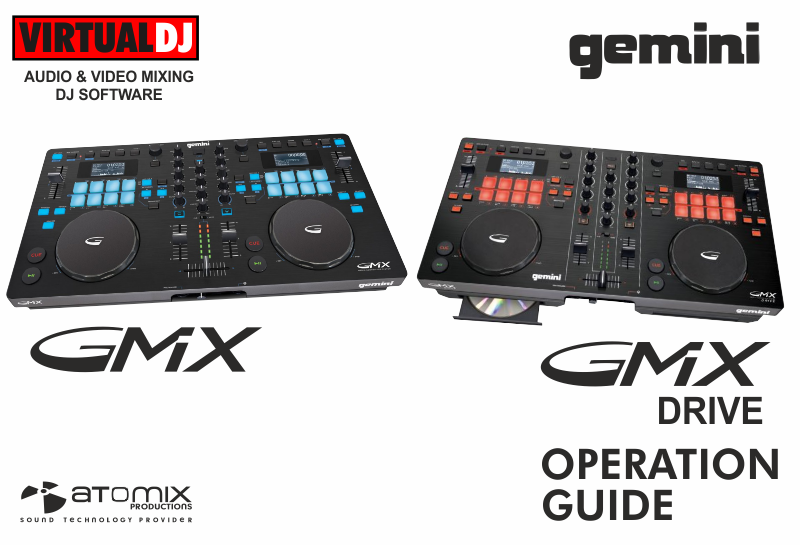
SETUP
Firmware
Update the firmware of the unit to the latest version, following instructions provided at:
Gemini GMX: http://geminisound.com/product/gmx (Downloads tab)
Gemini GMX DRIVE: http://geminisound.com/product/gmx-drive (Downloads tab)
Drivers
Windows: Download and install the latest ASIO drivers from:
Gemini GMX: http://geminisound.com/product/gmx (Downloads tab)
Gemini GMX DRIVE: http://geminisound.com/product/gmx-drive (Downloads tab)
Mac OSX. No drivers are necessary to install for Mac computers. The Operating system will use its own audio drivers when the unit is connected to the USB port.
Connections
Connect the Gemini GMX to a USB port of your computer. Plug a pair of amplified speakers to the rear Master Output of the unit and your Headphones to the front socket. Connect the provided AC/DC power adaptor. Power on the unit once all the connections are done.
VirtualDJ 8 Setup
If your unit came with VirtualDJ LE, use the provided CD (or download from http://www.virtualdj.com/le ) to install VirtualDJ (will install the custom LE skin along with the application)
Once VirtualDJ 8 is launched, a Login Window will appear. Login with your virtualdj.com account credentials.
A Pro Infinity, a PLUS, a Subscription License or a VirtualDJ LE Keycode (serial) is required to use the Gemini GMX/GMX DRIVE. Without any of the above Licenses, the controller will operate for 10 minutes each time you restart VirtualDJ 8.
http://www.virtualdj.com/buy/index.html

Click on the Use Soundcard button if you have followed the connections as above.
If your GMX came with a VirtualDJ LE Keycode, use the Enter Keycode button you will see in the detection window to enter it. If a Pro Infinity or Plus license is available and you have logged in the previous window, this button will not be available.
Click OK
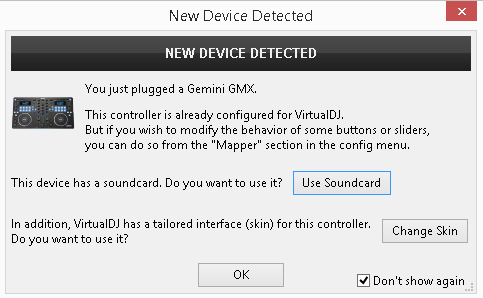
INTERFACE (Skin)
The tailored skin of the Gemini GMX, which is automatically loaded with VirtualDJ 8 LE version, is also available for download at http://www.virtualdj.com/plugins/ for those who do not wish to install the LE version from the provided CD.
The unit is now ready to operate.
Advanced Setup
The unit should be visible in the CONTROLLERS tab of Config and the “factory default” available/selected from the Mappings drop-down list.
The factory default Mapping offers the functions described in this Manual, however those can be adjusted to your needs via VDJ Script actions.
A Pro Infinity, a PLUS or a Subscription license is required to customize the mapping of the GMX (the CONTROLLERS tab will not be available in LE mode).
Find more details at http://www.virtualdj.com/wiki/VDJ8script.html
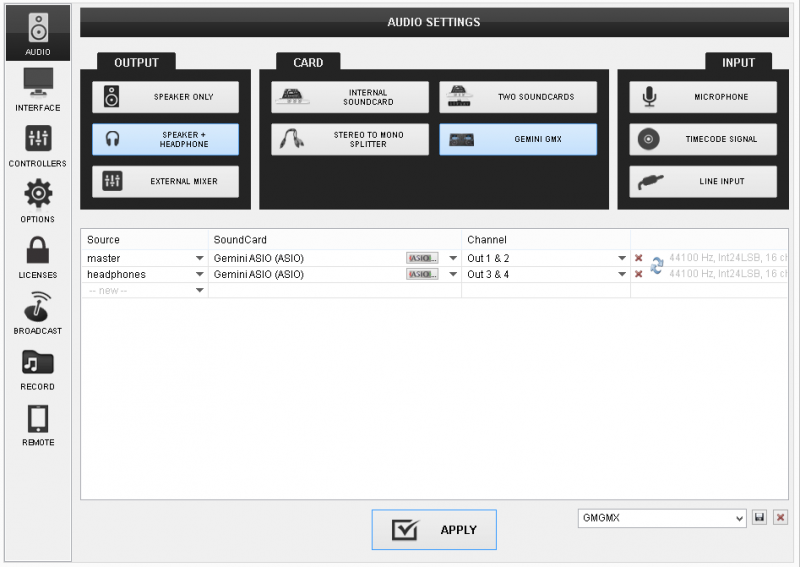
The unit has a pre-defined Audio setup and a special button in the AUDIO tab of Config to provide that. Alternative Audio setups can be applied in the same window in case a different sound card other than the built-in of the GMX needs to be used.
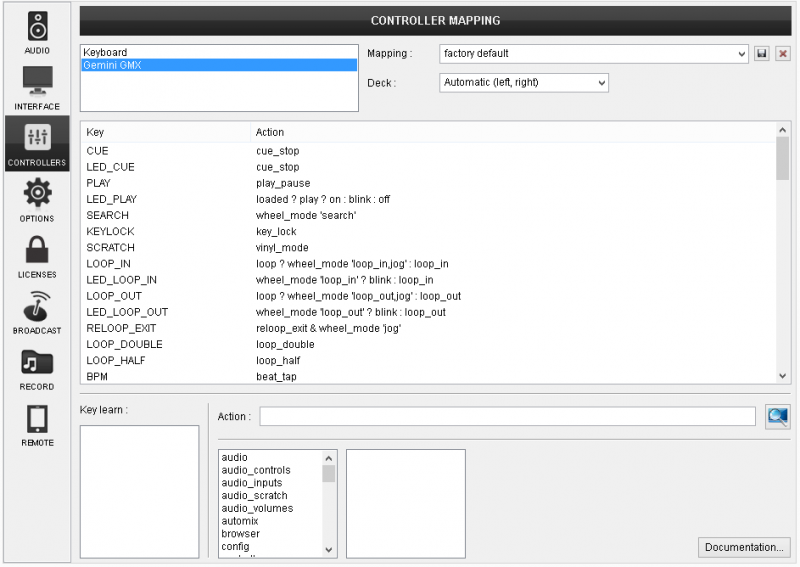
For further VirtualDJ settings and features please refer to the User Guide of VirtualDJ 8.
http://www.virtualdj.com/manuals/virtualdj8/index.html
LAYOUT
S. SHIFT. Hold this button down to access secondary functions of the GMX (mainly in blue lettering)
M. MODE. Use this button to select the Input Source. When lit (MIDI MODE) the unit will control VirtualDJ software or any other MIDI application. When unlit the GMX will search for the available/connected devices. Choose from Top USB Source, Rear USB Source (or CD Drive for the GMX Drive model)
Note that the sound output of VirtualDJ will be muted when switched from MIDI to USB mode.
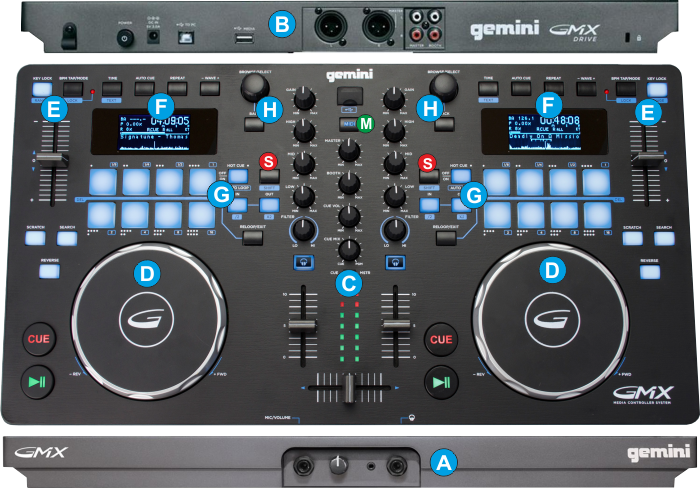
The functionality of each button, knob and connection per section (as shown in the image above) will be explained in detail in the next chapters
A. Front Panel
B. Rear Panel
C. Deck Transport Controls
D. Tempo Controls
E. LCD Screen
F. Pads (Hotcues & Loops)
G. Browser Controls
Front Side

- MIC INPUT. Connect a ¼” microphone to this input.
- MIC LEVEL. Adjust the Output Volume of the Microphone Input.
Note. The offered Microphone Input of the Gemini GMX is routed directly to the Master Output and cannot be assigned or controlled by VirtualDJ. Therefore the Microphone section of the VirtualDJ GUI will be unavailable, and the Microphone Input cannot be added to the Audio Setup or recorded from the software. - HEADPHONES SOCKET. Connect your ¼” or 1/8” headphones to this output for cueing and mix monitoring. The level of this output is controlled with the CUE VOL knob on the top panel.
Rear Side

- POWER. Connect the supplied AC/CD Adaptor. Power on the unit when all audio connections are made.
- USB. This USB connection sends and receives audio and control information from a connected computer.
- REAR USB SOURCE. Connect a USB storage device (USB flash drive or Hard Drive) with your Music Media files. The device will be offered on the LCD display when the USB mode is enabled as REAR.
- MASTER OUTPUT (XLR). Connect this low-impedance XLR output to a PA system or powered monitors. The level of this output is controlled with the Master knob on the top panel.
- MASTER OUTPUT (RCA): Use standard RCA cables to connect this output to amplified speakers or amplifier system. The level of this output is controlled by the MASTER knob on the top panel.
- BOOTH OUTPUT (RCA): Use standard RCA cables to connect this output to a booth monitoring system. The level of this output is controlled by the BOOTH knob on the top panel.
Mixer
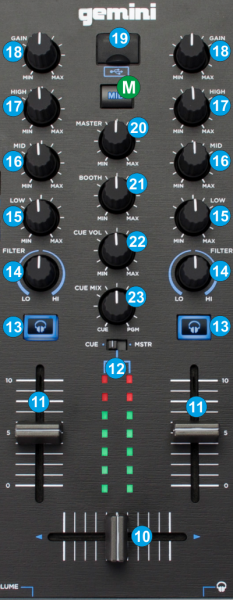
- CROSSFADER. Blends audio between the left and right channels/decks.
- VOLUME. Use these faders to control the Output volume of the left and right channels/decks
- VU METERS. When the CUE/MSTR switcher is at CUE position, the VU Meters will indicate the Pre-fader Output Volume of the left and right channel/deck respectively. When in MSTR position, the VU Meters will indicate the Output level of the Master Output.
- PFL. Press these buttons to send left or/and right channel's pre-fader signal to the Headphones Channel for monitoring. When engaged, the button will be lit.
- FILTER. Use this knob to apply a resonance Filter on the left or/and right channel/deck.
- EQ LOW. Adjusts the low (bass) frequencies of the left/right channel/deck.
- EQ MID. Adjusts the middle (mid) frequencies of the left/right channel/deck
- EQ HI. Adjusts the high (treble) frequencies of the left/right channel/deck
- GAIN. Adjust the Gain (Trim) of the left/right channel/deck. Try to keep lower than the 12 o clock position to avoid distortion.
- TOP USB SOURCE. Use this USB input to connect a USB storage device (USB flash drive or Hard Drive) with your Music Media files. The device will be offered on the LCD display when the USB mode is enabled as TOP.
- MASTER: Adjusts the Volume of the Master Output Channel.
- BOOTH. Adjusts the Volume of the secondary Booth Output Channel
- CUE VOL. Adjusts the volume level of the Headphones Channel
- CUE MIX: Turn to mix between CUE and Master (PGM) in the Headphone channel. When all the way to the left, only channels routed to Cue (via the PFL buttons) will be heard. When all the way to the right, only the Master Output will be heard
Transport Controls

- PLAY. Plays / Pauses the track.
- CUE. When the Deck is paused, you can set a Cue Point by moving the Platter to place the Audio Pointer at the desired location and then pressing the Cue Button.
During playback, you can press the Cue Button to return the track to this Cue Point. (If you did not set a Cue Point, then it will return to the beginning of the track.).
If the Deck is paused, you can press and hold the Cue Button to play the track from the Temporary Cue Point. Releasing the Cue Button will return the track to the temporary Cue Point and pause it. - JOG. Touch sensitive jogwheel. Use the jogwheel to scratch or bend (depending on the Vinyl/Scratch mode selection) or fast seek through the track if the Search mode is enabled.
The Jogwheel also offers Loop In and Loop Out point adjustment (see Loop Controls) - REVERSE. Use this button to toggle between normal and reversed playback. When the reversed mode is selected, the button will be lit.
- SCRATCH. Press this button to set the Jogwheel to Vinyl (Scratch) or CD (Bend) mode. In Vinyl mode, use the outer part of the Jogwheel to bend (temporary speed up – slow down the tempo of the track).
- SEARCH. Press this button to set the Jogwheel to Search mode and use the Jogwheel to fast seek through the track Press again to return the Jogwheel to Jog (Scratch or Bend) mode.
The Gemini GMX custom skin will display an indication when the Search mode is selected.
Tempo Controls
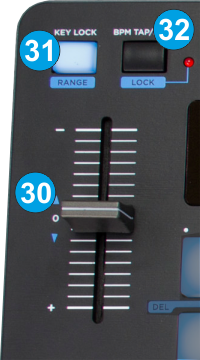
- PITCH. Adjust the track's playback speed (tempo). The pitch value in % and the current tempo value (BPM) are displayed on the LCD screen
Note. The actual pitch fader will not alter the pitch of the track if the actual pitch and the software pitch value do not match (software soft-takeover, ghost fader visible on the GUI). In most cases this may happen if SYNC is prior pressed or switching decks and the other deck is having a different pitch software value. - KEYLOCK. Press this button to "lock" the track's pitch to its original key. The track's tempo will remain at the speed designated by the Pitch Fader
Hold SHIFT down and then use this button to select the next available range for the Pitch.
The selected pitch range value is displayed on the LCD screen. - BPM TAP/LOCK. Tap this button (for at least 4 times) based on the rhythm of the track to manually adjust the tempo of the track (if incorrectly calculated by the software). When track is paused, tap this button once to move the Beatgrid anchor to the current position.
Hold SHIFT down and then use this button to automatically match the corresponding Deck's tempo with the opposite Deck's tempo and phase.
LCD Info
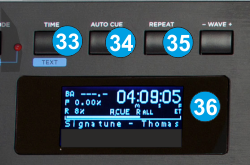
- TIME/TEXT. Use this button to cycle between the Remain and Elapsed Time Display on the LCD screen.
Hold SHIFT down and then use this button to cycle the Track’s Info on the LCD screen (Title, Artist, Album and Genre) - AUTOCUE. Use this button to cycle through the 3 available modes for the AutoCue.
When the indicator on the LCD screen is off, the tracks when loaded will start from the beginning of the track. On 2nd press, the tracks when loaded will start from the First Beat (skipping silence). On 3rd press, the tracks when loaded will start from the first assigned HotCue. - REPEAT. Use this button to enable the repeat mode. When enabled (indication as R1 on the LCD screen) the track will continue playing from the beginning (or other point depending on the AutoCue mode) when this reaches its end.
- LCD. LCD screen which displays Track’s Info (Title, Artist, Album and Genre), Remain or Elapsed Time, BPM, Pitch and Pitch range values and a song progress bar.
Note that the waveform view is not currently available on MIDI mode.
Hotcues & Loop Controls
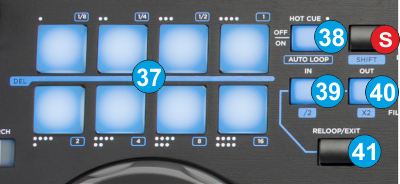
- PADS. The 8 Pads offer HotCues Loop and Loop functions depending on the selected mode (38). See Hot Cues and Auto Loops.
- PADS MODE. Use this button to toggle between the Hot Cues and Auto Loops mode for the 8 Pads (37).
- LOOP IN. Use this button to set a Loop In (Entry) point of a manual loop.
If a Loop is enabled press this button to set the Jogwheel to Loop In mode and then use the jogwheel to fine adjust the Entry point of the triggered Loop. The Led will blink to indicate the selected mode. Press again to return the Jogwheel to Jog mode.
Hold SHIFT down and then use this button to half the size of the triggered loop in beats. - LOOP OUT. Use this button to set a Loop Out (Exit) point of a manual loop.
If a Loop is enabled press this button to set the Jogwheel to Loop Out mode and then use the jogwheel to fine adjust the Exit point of the triggered Loop. The Led will blink to indicate the selected mode. Press again to return the Jogwheel to Jog mode.
Hold SHIFT down and then use this button to double the size of the triggered loop in beats. - RELOOP/EXIT. Use this button to exit a Loop or enable (and jump to the position) the last triggered one (reloop)
Hot Cues
When the HOTCUE/AUTOLOOP mode button (38) is unlit, the 8 Pads offer HotCue functions.
When a Hot Cue Button is unlit, you can assign a Hot Cue Point by pressing it at the desired point in your track. Once it is assigned, the Hot Cue Button will light. To return to that Hot Cue Point, simply press it.
Hold SHIFT down and then press a PAD to delete its assigned HotCue.
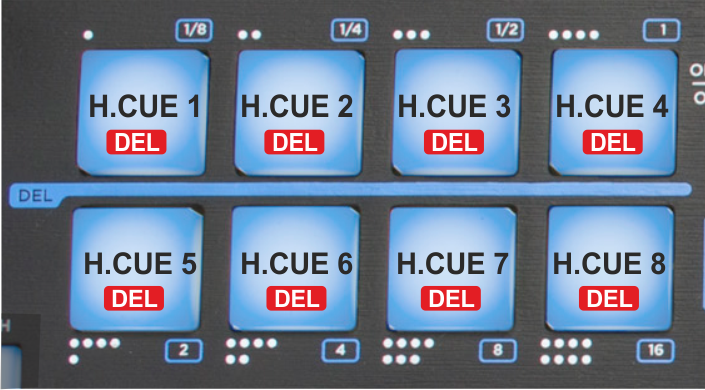
Loops
When the HOTCUE/AUTOLOOP mode button (38) is lit, the 8 Pads offer Auto Loop and Loop Roll functions.
Hold SHIFT down and then use the same Pads to trigger a momentary Loop Roll (while pressed) of the same size in beats as per the image. When the PAD is released the track will resume from the position it would have been if the Loop was never triggered.
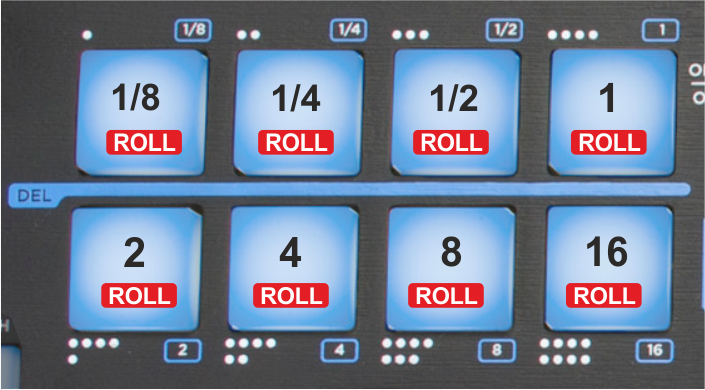
Browser Controls
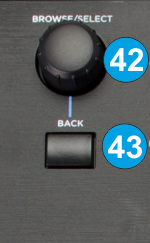
- BROWSE/SELECT. Use this encoder to scroll through files or folders (depending on the focused Browser window)
If focus is on the Songs list, push the encoder to load the selected track from the Browser to the left or right deck. If focus is on the Folders list, push the encoder to set focus to the Songs list.
- BACK. Press this button to set focus to the Folders list. If focus is on the folders list, use this button to expand/collapse subfolders.
